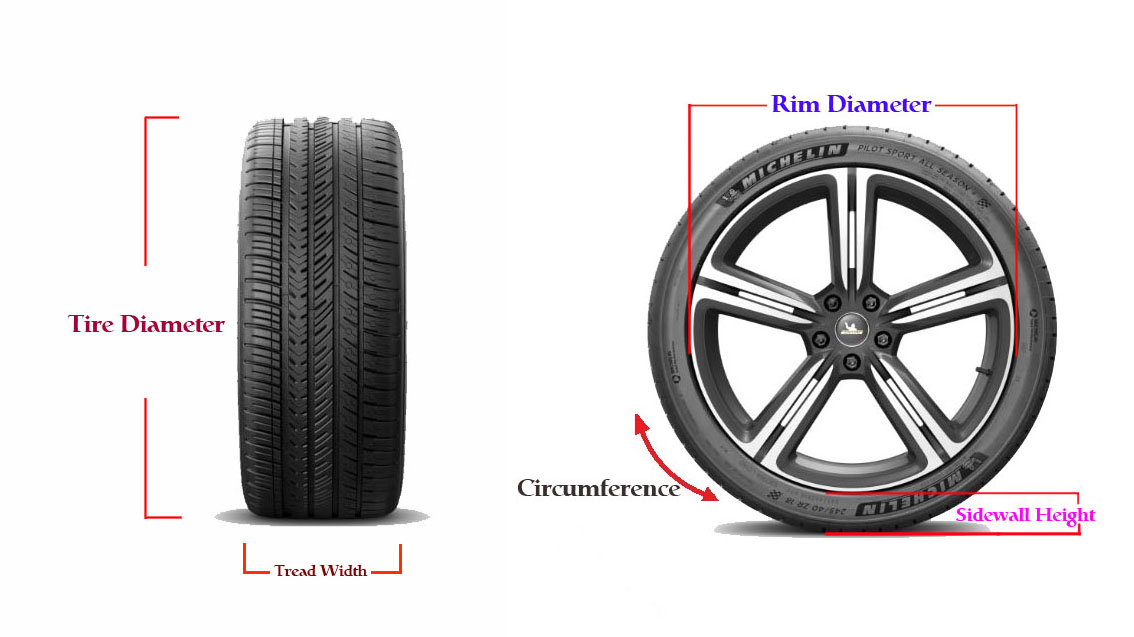Tire Size by VIN - Find Your Vehicle's Tire Size Using VIN Number
Your Vehicle Identification Number (VIN) contains valuable information about your vehicle, including the original tire specifications. Learn how to decode your VIN and find the correct tire size for your vehicle.

Your VIN number contains the key to finding the correct tire size for your vehicle.
What is a VIN Number?
A Vehicle Identification Number (VIN) is a unique 17-character code that serves as your vehicle's fingerprint. It contains detailed information about your vehicle's manufacturer, model, year, engine type, and original specifications, including tire size.
VIN Number Format
1HGBH41JXMN109186
Each character provides specific information about your vehicle
Understanding Your VIN Number
VIN Structure Breakdown
- Characters 1-3: World Manufacturer Identifier (WMI)
- Characters 4-9: Vehicle Descriptor Section (VDS)
- Character 10: Model Year
- Character 11: Plant Code
- Characters 12-17: Production Sequence Number
Example VIN Decoding
1HGBH41JXMN109186
- 1HG: Honda Motor Company
- BH41JX: Civic Sedan, 1.8L engine
- M: 2021 model year
- N: Marysville, Ohio plant
- 109186: Production sequence
How to Find Tire Size Using VIN
Method 1: Online VIN Decoder
Steps:
- Locate your VIN number
- Visit a VIN decoder website
- Enter your 17-digit VIN
- Look for tire specifications
- Note the original tire size
Pros: Quick and easy, comprehensive information
Cons: May not show all tire options
Method 2: Manufacturer Website
Steps:
- Visit your vehicle manufacturer's website
- Find the parts or specifications section
- Enter your VIN number
- Access detailed vehicle specifications
- Find tire size information
Pros: Most accurate, official information
Cons: May require account registration
Method 3: Dealer Service
Steps:
- Contact your vehicle dealer
- Provide your VIN number
- Request tire specifications
- Get professional recommendations
- Consider alternative tire options
Pros: Professional advice, warranty considerations
Cons: May involve service fees
Where to Find Your VIN Number
Common VIN Locations
- Dashboard: Driver's side, visible through windshield
- Driver's Door: Door jamb or door frame
- Engine Bay: Firewall or engine block
- Trunk/Liftgate: Inside trunk or under spare tire
- Registration: Vehicle registration document
- Insurance Card: Insurance policy documents
VIN Number Format
- Length: Always 17 characters
- Characters: Numbers 0-9 and letters A-Z (excluding I, O, Q)
- No Spaces: Continuous string of characters
- Case: Usually uppercase letters
- Check Digit: 9th character is a check digit
What Tire Information VIN Provides
Original Tire Specifications
- Tire Size: Width, aspect ratio, rim diameter
- Load Rating: Maximum load capacity
- Speed Rating: Maximum safe speed
- Tire Type: All-season, summer, winter
- Brand: Original equipment manufacturer
- Model: Specific tire model
Additional Vehicle Information
- Manufacturer: Vehicle brand and company
- Model Year: Year of manufacture
- Engine Type: Engine size and configuration
- Body Style: Sedan, SUV, truck, etc.
- Transmission: Manual or automatic
- Safety Features: Standard safety equipment
Alternative Methods to Find Tire Size
1. Tire Sidewall Reading
Look for the tire size code on the sidewall of your current tires. This is the most direct method if your tires are in good condition.
Example: 205/65R16 95H
2. Owner's Manual
Check your vehicle's owner's manual for tire specifications and recommendations. This provides the most comprehensive information.
3. Door Jamb Sticker
Look for a sticker on the driver's door jamb that contains tire pressure and size information.
4. Online Tire Size Databases
Use online databases that allow you to search by year, make, and model to find tire specifications.
Common Issues and Solutions
❌ VIN Not Found
If your VIN is not recognized in online databases, it may be too old or from a rare manufacturer. Try manufacturer-specific resources or contact the dealer.
❌ Multiple Tire Options
Some vehicles have multiple tire size options. Check your specific trim level and options to determine the correct tire size.
❌ Aftermarket Modifications
If your vehicle has been modified with different wheels or tires, the VIN may not reflect the current tire size.
✅ Verification Methods
Always verify tire size information from multiple sources and consult with professionals when in doubt.
Professional Recommendations
Best Practices
- •Verify Information: Cross-reference VIN data with multiple sources
- •Check Current Tires: Compare VIN data with current tire size
- •Consider Modifications: Account for any aftermarket changes
- •Professional Consultation: Seek expert advice when uncertain
Safety Considerations
- •Load Capacity: Ensure tires can handle vehicle weight
- •Speed Rating: Match or exceed vehicle capabilities
- •Warranty: Consider warranty implications
- •Professional Installation: Use qualified technicians
Ready to Find Your Tire Size?
Use our interactive tire size calculator and VIN decoder to find the perfect tires for your vehicle.